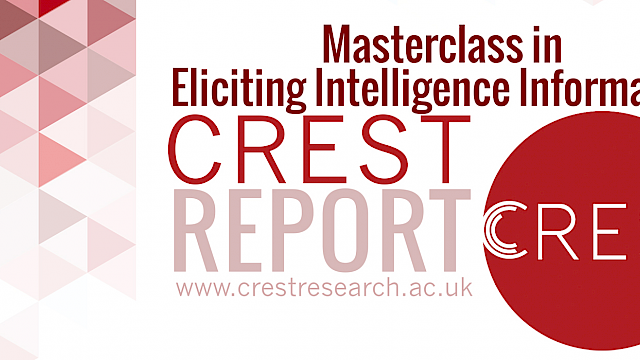Executive summary
The psycholegal literature stresses the importance of rapport for a successful investigative interview. Rapport is believed to be effective because it makes interviewees feel more comfortable and safer, fostering cooperation, and encourages witnesses to try to recall information, facilitating information gain. Indeed, experimental research has found rapport-building to increase the likelihood as well as the accuracy of disclosure from both child and adult witnesses.
The tactics recommended for rapport-building consist of verbal (e.g. finding common ground) and non-verbal behaviours (e.g. displaying empathy) behaviours. Most of the research has examined rapport in in-person contexts, where both types of behaviours are present. Not all interviews, however, take place face-to-face.
The internet has transformed the way individuals communicate, and online communication is now ubiquitous and common
The internet has transformed the way individuals communicate and online communication is now ubiquitous and common. In this study, we were interested in the effectiveness of conducting online witness interviews via chat, which de-emphasises the use of non-verbal rapport behaviours, compared to traditional in-person interviews.
Participants (N = 131) experienced a virtual reality scenario depicting a mock crime and were interviewed either in person or online via the chat function on Skype. We found that participants perceived rapport more positively when interviewed in person on three out of the five measures: attentiveness, trust/respect, and expertise.
This indicates that, in witness interviews, non-verbal behaviours are instrumental for the quality of rapport, which fits with earlier reasoning that non-verbal behaviours are key elements in the development of feelings of rapport between communicators. These results also suggest that there could have been detrimental effects of anonymity. Excluding non-verbal behaviour potentially causes hesitation or even distrust in assessing the interviewer as a professional.
This indicates that, in witness interviews, non-verbal behaviours are instrumental for the quality of rapport
Two other measures, cultural similarity and connected flow were not perceived differently across the interview medium. These two measures focus more on the interviewer-interviewee dynamic. Relevant for the use of chat in witness interviews is the lack of difference in the connected flow subscale, which measures interviewees’ perceived ease of communication with the interviewer.
Considering that the purpose of rapport is to facilitate communication between interviewers and interviewees and to foster disclosure, it is relevant that participants in the chat condition felt as connected to the interviewer as those in person.
Even though our results showed that chat interviews may be less appropriate for building rapport in some respects, this did not result in the reporting of less crime-related details and lower overall statement accuracy. Notably, we did find that in-person interviews yielded a greater number of peripheral details in comparison to chat interviews.
This finding fits with the notion that online environments promote more focused, direct interactions. However, participants interviewed in-person also provided more incorrect details. This observation can be interpreted in light of the social expectancies of in-person interactions. Participants interviewed in-person may have felt more pressured to provide information when prompted with follow-up questions post free recall (i.e. “Is there anything else you can tell me about…”), thus providing peripheral details they were less confident about.
In-person interviews yielded better rapport ratings than interviews via chat but were equally productive in terms of the quality of information obtained
In sum, we found that in-person interviews yielded better rapport ratings than interviews via chat but were equally productive in terms of the quality of information obtained, as measured by crime-related details and accuracy.
Practically, our findings emphasise that when witnesses are interviewed via chat, interviewers must carefully consider how to compensate for the lack of those non-verbal rapport tactics that influence witnesses’ perceptions of attentiveness, trust/respect, and interviewer’s expertise.
Continuing our understanding of online rapport-building will help inform best witness-interviewing practices in an increasingly digitised society.
Read more
- Abbe, A., & Brandon, S. E. (2013). The role of rapport in investigative interviewing: A review. Journal of Investigative Psychology and Offender Profiling, 10(3), 237–249. https://doi.org/10.1002/jip.1386
- Abbe, A., & Brandon, S. E. (2014). Building and maintaining rapport in investigative interviews. Police Practice and Research: An International Journal, 15(3), 207–220. https://doi.org/10.1080/15614263.2013.827835
- Adair, W. L., N. Buchan, and X. P. Chen. (2009). Communication and Social Interaction Style (CSIS): Reconceptualization and scale development [paper presentation]. Paper presented at the Association for International Business conference, San Diego, CA, United States.
- Adair, W. L., Buchan, N. R., Chen, X. P., & Liu, D. (2016). A model of communication context and measure of context dependence. Academy of Management Discoveries, 2(2), 198–217. https://doi.org/10.5465/amd.2014.0018
- Almerigogna, J., Ost, J., Akehurst, L., & Fluck, M. (2008). How interviewers' nonverbal behaviors can affect children's perceptions and suggestibility. Journal of Experimental Child Psychology, 100(1), 17–39. https://doi.org/10.1016/j.jecp.2008.01.006
- Beune, K., Giebels, E., & Taylor, P. J. (2010). Patterns of interaction in police interviews: The role of cultural dependency. Criminal Justice and Behavior, 37(8), 904–925. https://doi.org/10.1177/0093854810369623
- Blau, I., & Barak, A. (2012). How do personality, synchronous media, and discussion topic affect participation? Educational Technology & Society, 15(2), 12–24. https://www.jstor.org/stable/10.2307/jeductechsoci.15.2.12
- Braeutigam, A. M. (2006). What I hear you writing is... issues in ODR: building trust and rapport in the text-based environment. University of Toledo Law Review, 38(1), 101–124
- Brimbal, L., Kleinman, S. M., Oleszkiewicz, S., & Meissner, C. A. (2019). Developing rapport and trust in the interrogative context: An empirically supported and ethical alternative to customary interrogation practices. In S. J. Barela, M. J. Fallon,
- G. Gaggioli, & J. D. Ohlin (Eds.), Interrogation and torture: Integrating efficacy with law and morality. Oxford University Press. https://doi.org/10.1093/oso/9780190097523.003.0006
- Clarke, C., & Milne, R. (2001). A national evaluation of the PEACE Investigative Interviewing Course (p. 187). London: Home Office
- Collins, R., Lincoln, R., & Frank, M. G. (2002). The effect of rapport in forensic interviewing. Psychiatry, Psychology and Law, 9(1), 69–78 https://doi.org/10.1375/pplt.2002.9.1.69
- De La Fuente Vilar, A., Horselenberg, R., Strömwall, L. A., Landström, S., Hope, L., & Koppen, P. J. (2020). Effects of cooperation on information disclosure in mock‐witness interviews. Legal and Criminological Psychology, 25(2), 133–149. https://doi.org/10.1111/lcrp.12167
- Duke, M. C., Wood, J. M., Bollin, B., Scullin, M., & LaBianca, J. (2018). Development of the Rapport Scales for Investigative Interviews and Interrogations (RS3i), Interviewee Version. Psychology, Public Policy, and Law, 24(1), 64–79. https://doi.org/10.1037/law0000147
- Ekberg, S., Barnes, R., Kessler, D., Malpass, A., & Shaw, A. (2013). Managing the therapeutic relationship in online cognitive behavioural therapy for depression: Therapists' treatment of clients' contributions. Language@ Internet, 10. https://eprints.qut.edu.au/59061/
- Fisher, R. P. (1995). Interviewing victims and witnesses of crime. Psychology, Public Policy, and Law, 1(4), 732–764. https://doi.org/10.1037/1076-8971.1.4.732
- Fisher, R. P., & Geiselman, R. E. (1992). Memory enhancing techniques for investigative interviewing: The cognitive interview. Charles C Thomas, Publisher.
- Fenichel, M., Suler, J., Barak, A., Zelvin, E., Jones, G., Munro, K., Meunier, V., & Walker-Schmucker, W. (2002). Myths and realities of online clinical work. Cyber Psychology & Behavior, 5(5), 481–497. https://doi.org/10.1089/109493102761022904
- Gabbert, F., Hope, L., Luther, K., Wright, G., Ng, M., & Oxburgh, G. (2020). Exploring the use of rapport in professional information‐gathering contexts by systematically mapping the evidence base. Applied Cognitive Psychology. Advance online publication. https://doi.org/10.1002/acp.3762
- Geiselman, E., Fisher, R. P., Firstenberg, I., Hutton, L. A., Sullivan, S. J., Avetissian, I. V., & Prosk, A. L. (1984). Enhancement of eyewitness memory: An empirical evaluation of the cognitive interview. Journal of Police Science & Administration, 12(1), 74–80
- Gregory, A. H., Schreiber Compo, N., Vertefeuille, L., & Zambruski, G. (2011). A comparison of US police interviewers' notes with their subsequent reports. Journal of Investigative Psychology and Offender Profiling, 8(2), 203–215. https://doi.org/10.1002/jip.139
- Hall, E. T. 1976. Beyond Culture. Anchor, Garden City, NY
- Hamilton, G., Whiting, E. A., Brubacher, S. P., & Powell, M. B. (2017). The effects of face‐to‐face versus live video‐feed interviewing on children's event reports. Legal and Criminological Psychology, 22(2), 260–273. https://doi.org/10.1111/lcrp.12098
- Henderson, S., & Gilding, M. (2004). ‘I’ve never clicked this much with anyone in my life’: Trust and hyperpersonal communication in online friendships. New Media & Society, 6(4), 487–506. https://doi.org/10.1177/146144804044331
- Hoogesteyn, K., Meijer, E., & Vrij, A. (2019). The influence of room spaciousness on investigative interviews. Legal and Criminological Psychology, 24(2), 215–228. https://doi.org/10.1111/lcrp.12156
- Huang, K.-J., & Teoh, Y.-S. (2019). Rapport building in suspect interviewing: A comparison of relationship- and procedure-based approaches in a laboratory setting. Psychology, Public Policy, and Law, 25(4), 253–265. https://doi.org/10.1037/law0000209
- Joinson, A. N. (2001). Self-disclosure in computer-mediated communication: The role of self-awareness and visual anonymity. European Journal of Social Psychology, 31(2), 177–192. https://doi.org/10.1002/ejsp.36
- Kelly, C. E., Miller, J. C., Redlich, A. D., & Kleinman, S. M. (2013). A taxonomy of interrogation methods. Psychology, Public Policy, and Law, 19(2), 165–178. https://doi.org/10.1037/a0030310
- Kieckhaefer, J. M., Vallano, J. P., & Schreiber Compo, N. (2014). Examining the positive effects of rapport building: When and why does rapport building benefit adult eyewitness memory? Memory, 22(8), 1010–1023. https://doi.org/10.1080/09658211.2013.864313
- King, R., Bambling, M., Reid, W., & Thomas, I. (2006). Telephone and online counselling for young people: A naturalistic comparison of session outcome, session impact and therapeutic alliance. Counselling and Psychotherapy Research, 6(3), 175–181. https://doi.org/10.1080/14733140600874084
- Leander, L., Granhag, P. A., & Christianson, S. Å. (2009). Children's reports of verbal sexual abuse: Effects of police officers' interviewing style. Psychiatry, Psychology and Law, 16(3), 340–354. https://doi.org/10.1080/13218710902930226
- Lopez, A., Schwenk, S., Schneck, C. D., Griffin, R. J., & Mishkind, M. C. (2019). Technology-based mental health treatment and the impact on the therapeutic alliance. Current Psychiatry Reports, 21, Article 76. https://doi.org/10.1007/s11920-019-1055-7
- Nagel, D. M., & Anthony, K. (2011). Text-based online counseling: Chat. In R. Kraus, G. Stricker, & C. Speyer (Eds.), Online counseling: A handbook for mental health professionals (2nd ed., pp. 169–182). Academic Press. https://doi.org/10.1016/B978-0-12-378596-1.00009-5
- Nash, R. A., Houston, K. A., Ryan, K., & Woodger, N. (2014). Remembering remotely: would video-mediation impair witnesses' memory reports? Psychology, Crime & Law, 20(8), 756–768. https://doi.org/10.1080/1068316X.2013.857669
- Richards, P., Simpson, S., Bastiampillai, T., Pietrabissa, G., Castelnuovo, G. (2018). The impact of technology on therapeutic alliance and engagement in psychotherapy: The therapist’s perspective. Clinical Psychologist, 22(2), 171–81. https://doi.org/10.1111/cp.12102
- Selwyn, N., Gorard, S., Furlong, J., & Madden, L. (2003). Older adults' use of information and communications technology in everyday life. Ageing & Society, 23(5), 561–582. https://doi.org/10.1017/S0144686X03001302
- Skinner, A. E., & Latchford, G. (2006). Attitudes to counselling via the Internet: A comparison between in-person counselling clients and Internet support group users. Counselling and Psychotherapy Research, 6(3), 158–163. https://doi.org/10.1080/14733140600853641
- Slagter van Tryon, P. J., & Bishop, M. J. (2012). Evaluating social connectedness online: The design and development of the Social Perceptions in Learning Contexts Instrument. Distance Education, 33(3), 347–364. https://doi.org/10.1080/01587919.2012.723168
- Smeets, T., Candel, I., & Merckelbach, H. (2004). Accuracy, completeness, and consistency of emotional memories. The American Journal of Psychology, 117(4), 595–609. https://doi.org/10.2307/4148994
- Sztompka, P. (1999). Trust: A sociological theory. Cambridge University Press.
- Taylor, D. A., & Dando, C. J. (2018). Eyewitness memory in face-to-face and immersive avatar-to-avatar contexts. Frontiers in Psychology, 9, Article 507. https://doi.org/10.3389/fpsyg.2018.00507
- Tickle-Degnen, L., & Rosenthal, R. (1990). The nature of rapport and its nonverbal correlates. Psychological Inquiry, 1(4), 285–293. https://doi.org/10.1207/s15327965pli0104_1
- Vallano, J. P., Evans, J. R., Schreiber Compo, N., & Kieckhaefer, J. M. (2015). Rapport- building during witness and suspect interviews: A survey of law enforcement. Applied Cognitive Psychology, 29(3), 369–380. https://doi.org/10.1002/acp.3115
- Vrocharidou, A., & Efthymiou, I. (2012). Computer mediated communication for social and academic purposes: Profiles of use and university students’ gratifications. Computers & Education, 58(1), 609–616. https://doi.org/10.1016/j.compedu.2011.09.015
- Wachi, T., Watanabe, K., Yokota, K., Otsuka, Y., Kuraishi, H., & Lamb, M. (2014). Police interviewing styles and confessions in Japan. Psychology, Crime & Law, 20(7), 673–694. https://doi.org/10.1080/1068316X.2013.854791
- Yokotani, K., Takagi, G., & Wakashima, K. (2018). Advantages of virtual agents over clinical psychologists during comprehensive mental health interviews using a mixed methods design. Computers in Human Behavior, 85, 135–145. https://doi.org/10.1016/j.chb.2018.03.045
Copyright Information
As part of CREST’s commitment to open access research, this text is available under a Creative Commons BY-NC-SA 4.0 licence. Please refer to our Copyright page for full details.
IMAGE CREDITS: Copyright ©2024 R. Stevens / CREST (CC BY-SA 4.0)






